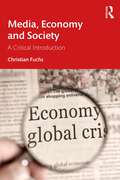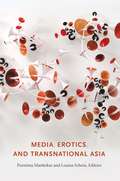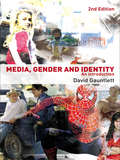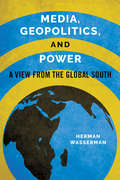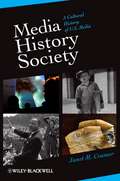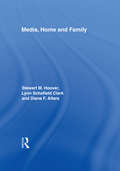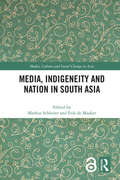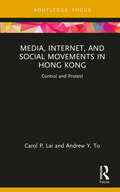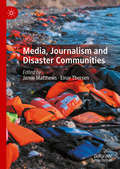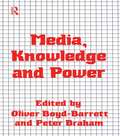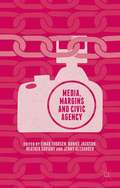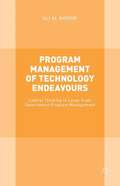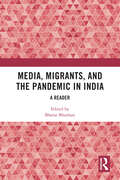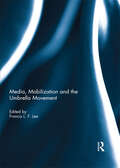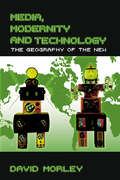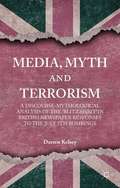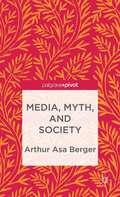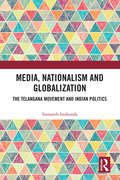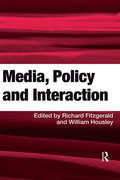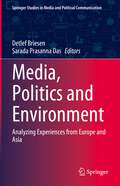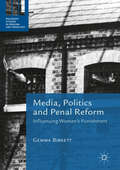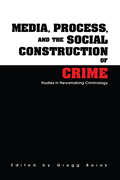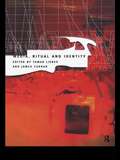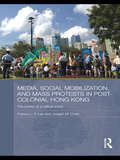- Table View
- List View
Media, Economy and Society: A Critical Introduction
by Christian FuchsThis essential guide to the critical study of the media economy in society teaches students how to critically analyse the political economy of communication and the media. The book introduces a variety of methods and topics, including the political economy of communication in capitalism, the political economy of media concentration, the political economy of advertising, the political economy of global media and transnational media corporations, class relations and working conditions in the capitalist media and communication industry, the political economy of the Internet and digital media, the information society and digital capitalism, the public sphere, Public Service Media, the Public Service Internet, and the political economy of media management. This will be an ideal textbook for a variety of courses relating to media and communication, including Media Economics; Political Economy of Communication; Media, Culture, and Society; Critical Media and Communication Studies; Media Sociology; Media Management; and Media Business Studies.
Media, Erotics, and Transnational Asia
by Purnima Mankekar Louisa ScheinDrawing on methods and approaches from anthropology, media studies, film theory, and cultural studies, the contributors to Media, Erotics, and Transnational Asia examine how mediated eroticism and sexuality circulating across Asia and Asian diasporas both reflect and shape the social practices of their producers and consumers. The essays in this volume cover a wide geographic and thematic range, and combine rigorous textual analysis with empirical research into the production, circulation, and consumption of various forms of media.Judith Farquhar examines how health magazines serve as sources of both medical information and erotic titillation to readers in urban China. Tom Boellstorff analyzes how queer zines produced in Indonesia construct the relationship between same-sex desire and citizenship. Purnima Mankekar examines the rearticulation of commodity affect, erotics, and nation on Indian television. Louisa Schein describes how portrayals of Hmong women in videos shot in Laos create desires for the homeland among viewers in the diaspora. Taken together, the essays offer fresh insights into research on gender, erotics, media, and Asia transnationally conceived.Contributors. Anne Allison, Tom Boellstorff, Nicole Constable, Heather Dell, Judith Farquhar, Sarah L. Friedman, Martin F. Manalansan IV, Purnima Mankekar, Louisa Schein, Everett Yuehong Zhang
Media, Gender and Identity
by David GauntlettPopular media present a vast array of stories about women and men. What impact do these images and ideas have on people's identities? The new edition of Media, Gender and Identity is a highly readable introduction to the relationship between media and gender identities today. Fully revised and updated, including new case studies and a new chapter, it considers a wide range of research and provides new ways for thinking about the media's influence on gender and sexuality. David Gauntlett discusses movies such as Knocked Up and Spiderman 3, men's and women's magazines, TV shows, self-help books, YouTube videos, and more, to show how the media play a role in the shaping of individual self-identities. The book includes: a comparison of gender representations in the past and today, from James Bond to Ugly Betty an introduction to key theorists such as Judith Butler, Anthony Giddens and Michel Foucault an outline of creative approaches, where identities are explored with video, drawing, or Lego bricks a Companion Website with extra articles, interviews and selected links, at: www.theoryhead.com.
Media, Geopolitics, and Power: A View from the Global South (Geopolitics of Information)
by Herman WassermanThe end of apartheid brought South Africa into the global media environment. Outside companies invested in the nation's newspapers while South African conglomerates pursued lucrative tech ventures and communication markets around the world. Many observers viewed the rapid development of South African media as a roadmap from authoritarianism to global modernity. Herman Wasserman analyzes the debates surrounding South Africa's new media presence against the backdrop of rapidly changing geopolitics. His exploration reveals how South African disputes regarding access to, and representation in, the media reflect the domination and inequality in the global communication sphere. Optimists see post-apartheid media as providing a vital space that encourages exchanges of opinion in a young democracy. Critics argue the public sphere mirrors South Africa's past divisions and privileges the viewpoints of the elite. Wasserman delves into the ways these simplistic narratives obscure the country's internal tensions, conflicts, and paradoxes even as he charts the diverse nature of South African entry into the global arena.
Media, History, Society: A Cultural History Of U. S. Media
by Janet M. CramerMedia/History/Society offers a cultural history of media in the United States, shifting the lens of media history from media developments and evolution to a focus on changes in culture and society, emphasizing how media shaped and were shaped by these trends, policies, and cultural shifts. <p><p> Covers the topics that instructors want to teach <p> Provides a timely and relevant culturally determined perspective on media history in American society <p> Organized thematically rather than chronologically <p> Links history to contemporary issues, setting journalism into a broader historical context <p> Includes alternate table of contents, discussion questions, an instructor’s manual, and sample exams
Media, Home and Family
by Stewart M. Hoover Lynn Schofield Clark Diane F. AltersBased on extensive fieldwork, this book examines how parents make decisions regulating media use, and how media practices define contemporary family life.
Media, Indigeneity and Nation in South Asia (Media, Culture and Social Change in Asia)
by Markus Schleiter Erik De MaakerHow do videos, movies and documentaries dedicated to indigenous communities transform the media landscape of South Asia? Based on extensive original research, this book examines how in South Asia popular music videos, activist political clips, movies and documentaries about, by and for indigenous communities take on radically new significances. Media, Indigeneity and Nation in South Asia shows how in the portrayal of indigenous groups by both ‘insiders’ and ‘outsiders’ imaginations of indigeneity and nation become increasingly interlinked. Indigenous groups, typically marginal to the nation, are at the same time part of mainstream polities and cultures. Drawing on perspectives from media studies and visual anthropology, this book compares and contrasts the situation in South Asia with indigeneity globally.
Media, Internet, and Social Movements in Hong Kong: Control and Protest (Routledge Focus on Communication and Society)
by Carol P. Lai Andrew Y. ToFocusing on the unique story of the "recolonisation" of Hong Kong since 2019, this book describes the environment of news gathering and publishing during this period and studies how this has connected to wider political, economic, and social changes.Media, Internet and Social Movements in Hong Kong considers the operation of the news media in this divided region to illuminate the unparalleled experience of the transfer of sovereignty of the territory from a liberal democracy to a semi-authoritarian regime. This book examines key aspects of news production that constrain media freedom in the Hong Kong Special Administrative Region (HKSAR) including the routines and concrete cases of censorship exercised by state authorities; self-censorship by news organisations, and the roles of the Chinese and HKSAR governments as key sources of news. The authors also discuss the norms and values of journalists and citizens in Hong Kong as forces resisting control as well as the popular use of social media in mobilising anti-government protests.This compelling text will be of interest to students and scholars in the fields of journalism, media, and area studies, particularly those focusing on Greater China and the Asia-Pacific region.
Media, Journalism and Disaster Communities
by Einar Thorsen Jamie MatthewsThis book illuminates the concept of disaster communities through a series of international case studies. It offers an eclectic overview of how different forms of media and journalism contribute to our understanding of the lived experiences of communities at risk from, affected by, and recovering from disaster. This collection considers the different forms of media and journalism produced by and for communities and how they may recognise and speak to the different notions of community that emerge in disaster contexts – including vulnerabilities and consequences that arise from environmental destruction and geophysical hazards, the insecurity created by armed conflict and limitations on journalistic freedoms, and result from human (in)action and humanitarian crises.
Media, Knowledge and Power
by Oliver Boyd-Barrett Peter BrahamFirst Published in 1986. The readings reflect the current interest in the possible effects that such communications media may have upon children's studies and cognition and upon how children are likely to respond to education and educational media.
Media, Margins and Civic Agency
by Daniel Jackson Jenny Alexander Heather Savigny Einar ThorsenThis collection brings together new research on contemporary media, politics and power. It explores ways and means through which media can and do empower or dis-empower citizens at the margins that is, how they act as vehicles of, or obstacles to, civic agency and social change.
Media, Margins and Popular Culture
by Daniel Jackson Jenny Alexander Heather Savigny Einar ThorsenThis collection brings together leading research on contemporary and popular culture, focussing on marginalised voices and representations; socially marginalised, marginalised in media and media scholarship. It spans five continents, with contributions on topics like gender, sexuality, nation, disability, disciplinary boundaries, youth and age.
Media, Migrants and the Pandemic in India: A Reader
by Bharat BhushanThe national lockdown to contain the COVID-19 pandemic in India resulted in the loss of work and displacement of thousands of urban migrant workers. This book records the arduous journey home for many of these workers and analyses the grave effects the pandemic has had on jobs, livelihoods, and the health of urban migrant workers. A rich compilation of deep analytical articles by journalists, academics, lawyers, and social activists, this book explores various facets of the crisis as it unfolded. It examines the welfare policies of state and central governments and discusses the role of the judiciary and the public policy response to the unemployment, health risks, and mass migration of workers. It also offers readers a better understanding of the complexities of the migrant crisis, how it unfolded, and how it was addressed by the media. This timely and prescient book will be of great interest to the general reader as well as researchers and students of media studies, journalism, sociology, law, public policy, labour and economics, welfare economics, gender studies, and development studies.
Media, Mobilization and the Umbrella Movement
by Francis L. F. LeeThe Umbrella Movement in Hong Kong caught the world’s attention and imagination at the end of 2014. The 79-day occupation campaign took on some of the characteristics of the recent wave of large-scale protest movements around the world, including the prominent roles played by the media – both conventional and digital – in the mobilization and communication processes of the movement. This edited volume, Media, Mobilization and the Umbrella Movement, brings together nine contributions which examine various aspects of the media-movement nexus, including the power of televised images to mobilize people, the role of social media in the insurgent public sphere, young activists’ social media strategies, media influence on citizens’ understanding of civil disobedience, the government’s response to digital media tactics, public discourses about the rule of law, and local and foreign media coverage of the movement. We believe that this high-quality collection can not only enhance our understanding of the Umbrella Movement, but also facilitate and trigger more research and dialogue comparing the Umbrella Movement with other similar protest movements around the world. This book was originally published as a special issue of the Chinese Journal of Communication.
Media, Modernity and Technology: The Geography of the New (Comedia)
by David MorleyFrom best-selling author David Morley, this book presents a set of interlinked essays which discuss and examine some of the key debates in the fields of media and cultural studies. Spanning the last decade, this fascinating and readable book is based on interdisciplinary work on the interface of media and cultural studies, cultural geography and anthropology. Clearly structured in five thematic sections, the book surveys the potential contribution of art-based discourses to the field and offers critical perspectives on the emergence of the ‘new media’ of our age. Including discussion on the status and future of media and cultural studies as disciplines, the significance of technology and new media, and raising questions about the place of the magical in the newly emerging forms of techno-modernity in which we live today, this is a media student must-read.
Media, Myth and Terrorism
by Darren KelseyMedia, Myth and Terrorism provides a rigorous case study of Blitz mythology in British newspaper responses to the July 7th bombings. Considering how the press, politicians and members of the public were caught up in popular accounts of Britain's past, Kelsey explores the ideological battleground that took place in the weeks following the bombings as the myth of the Blitz was invoked. By providing conceptual discussions of myth, discourse, and ideology, Kelsey proposes a discourse-mythological framework designed for analysing discursive constructions of mythology. In doing so, this research considers multiple recontextualisations of the Blitz myth when popular memories of 1940 recurred in 2005. Kelsey encourages readers to understand the politics of remembering by showing how popular yet inaccurate stories from the past have a significant impact on our perceptions of the present. Heroism, trauma, economics, Royalty, rituals, human rights, foreign policy, immigration and multiculturalism are just some of the topics covered across a vast landscape of stories embracing a myth from the past in order to understand the present.
Media, Myth, and Society
by Arthur Asa BergerUsing a cultural approach to classical myths, this book examines how they affect psychoanalytic theory, historical experience, elite culture, popular culture, and everyday life. Berger explores diverse topics such as the Oedipus Myth, James Bond, Star Wars, and fairy tales.
Media, Nationalism and Globalization: The Telangana Movement and Indian Politics
by Sumanth InukondaThis book explores the meanings of nationalism in a post-globalization, postcolonial context. It provides an in-depth understanding of the relationship between marginalized groups, media and politics by a focused study of the Telangana movement in India. Events like the Arab Spring, unrest in Myanmar and Ukraine, and the Brexit, Kurdish and Catalan referendums have proved how catalytic the changing media environment has been in reshaping the nature of resistance and social movements. Based on the author’s ethnographic research, this book examines how marginalized groups engage with the media and their community to participate in political processes. Analyzing public meetings, folk performances, pamphlets and media reports of the Telangana movement, the author reflects on the cultural notions of nationalism and the politics of state formation in the post-colonial context. This volume also evaluates the role of students and intellectuals in contemporary social movements and in uniting the discontents of globalization. Highlighting intersections of performativity, geography and justice, this book examines changing articulations of identity and everyday forms of resistance. It will be useful for students and research scholars interested in media and communication, cultural studies, political sciences, ethnic and minority studies and sociocultural movements in India.
Media, Policy and Interaction
by William HousleySituated within the field of discourse-oriented approaches to policy and media, this collection explores the interface between government, media and the public, highlighting the increasing importance placed on media channelled 'public opinion' as part of a democratic process. The authors use a variety of discourse analytic methods including CA/MCA, Discourse Analysis and Interactionism, to provide discussions around the social organization of policy debate in media sites including news interviews, public access broadcasts, broadcast debates, panel discussions, mediated government initiatives, newspapers and news broadcasts. The book's geographical coverage spans the USA, Canada, the UK, Europe, Asia and Australia. This volume offers a major contribution to discourse analysis and its emphasis on policy substance will appeal to a broad audience in social and public policy, political communication, journalism and politics.
Media, Politics and Environment: Analyzing Experiences from Europe and Asia (Springer Studies in Media and Political Communication)
by Detlef Briesen Sarada Prasanna DasEnvironmental protection has not equally established itself as a permanent fixture in the political systems of all countries: to date, governments and entire societies have responded to environmental challenges in a variety of ways, and concrete environmental policy is still a highly national matter. Moreover, the perception of environmental problems varies considerably on a global scale. The reasons normally cited for these differences largely stem from the environmental policy debates themselves, e.g. poverty, ignorance, capital interests, etc. In contrast, this book shows that concrete environmental policy emerges from a complex interplay of mass media and political conflicts: first, the mass media provide the framework for national environmental policy through agenda-setting, framing and scandalization; second, the mass media thereby change values in the political and social discourse, e.g. by altering the perception of global commons and expanding the possibilities of interest articulation; and third, this can lead to political decision-making processes in which legal and other measures for environmental protection are enforced. The book systematically compares industrialized countries such as Germany and Japan with several rapidly emerging countries in South and Southeast Asia.
Media, Politics and Penal Reform
by Gemma BirkettThis book examines the nature of relations between penal reform campaigners, journalists and policymakers at the crime-media nexus. With a particular focus on women's penal policy, Birkett uncovers how reform strategies have augmented and developed under changing governments and the news media spotlight. While penal reformers have traditionally relied on the language of humanitarianism to influence the direction of policy, there remains an array of political and cultural sticking points. With a policy-focused orientation, this study provides a number of pragmatic and practical tips for those wishing to think more strategically about their ability to influence politicians, the media and the public. With unprecedented access to over thirty policy elites working around Westminster and Whitehall during the development of the Corston agenda (and beyond), this engaging and timely work exposes the triumphs and tribulations of such actors for the very first time.
Media, Process, and the Social Construction of Crime: Studies in Newsmaking Criminology (Current Issues in Criminal Justice #Vol. 10)
by Gregg BarakFirst published in 1995. Routledge is an imprint of Taylor & Francis, an informa company.
Media, Ritual and Identity (Communication and Society)
by James Curran Tamar LiebesMedia, Ritual and Identity examines the role of the media in society; its complex influence on democratic processes and its participation in the construction and affirmation of different social identities. It draws extensively upon cultural anthropology and combines a commanding overview of contemporary media debates with a series of fascinating case studies ranging from political ritual on television to broadcasting in the third world.
Media, Social Mobilisation and Mass Protests in Post-colonial Hong Kong: The Power of a Critical Event (Media, Culture and Social Change in Asia)
by Joseph M. Chan Francis L. LeeSince 2003, Hong Kong has witnessed a series of large-scale protests which have constituted the core of a reinvigorated pro-democracy movement. What drove tens of thousands of citizens to the street on a yearly basis to protest? What were the social and organizational bases of the protest movement? How did media and public discourses affect the protests’ formation and mobilization? How did the protesters understand their own actions and the political environment? This book tackles such questions by using a wide range of methods, including population and protest onsite surveys, media content analysis, and in-depth interviews with activists, politicians, and protest participants. It provides an account of the "self-mobilization processes" behind the historic July 1, 2003 protest, and how the protest kick-started new political dynamics and discursive contestations in the public arena which not only turned a single protest into a series of collective actions constituting a movement, but also continually shaped the movement’s characteristics and influence. The book is highly pertinent to readers interested in political development in Hong Kong, and as a case study on "the power of critical events," the book also has broad implications on the study of both media politics and social movements in general.
Media, Structures and Power
by Edward A. ComorMedia, Structures, and Power is a collection of the scholarly writing of Canada's leading communication and media studies scholar, Robert E. Babe. Spanning almost four decades of scholarship, the volume reflects the breadth of Babe's work, from media and economics to communications history and political economy.Babe famously characterized Canadian scholars' distinctive contribution to knowledge as uniquely historical, holistic, and dialectical. The essays in Media, Structures, and Power reflect this particular strength. With a clarity of vision, Babe critiques mainstream economics, Canadian government policy, and postmodernist thought in social science. Containing introductions and contributions by other prominent scholars, this volume situates Babe's work within contemporary scholarship and underscores the extent to which he is one of Canada's most prescient thinkers. His interdisciplinary analyses will remain timely and influential well into the twenty-first century.
